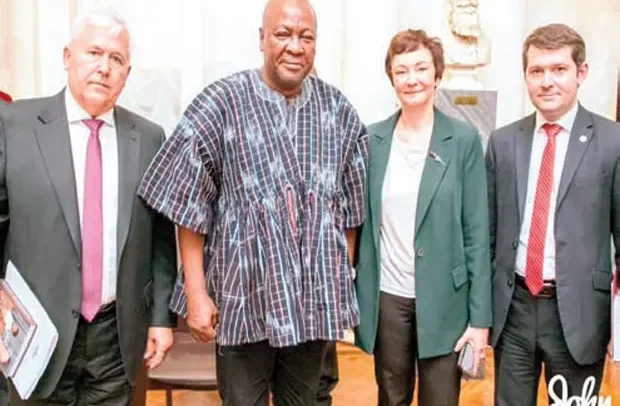John Mahama with some Russians in Moscow
Flagbearer of the opposition National Democratic Congress (NDC), John Dramani Mahama, is in Russia for a fundraising event that raises questions than answers.
Sources say the trip to Moscow, the Russian capital, is an avenue to meet Russian oligarchs for a possible financial support disguised in a book launch.
Even though Mahama was elected as the NDC’s flagbearer over a year ago, little is seen on the ground, creating apprehension among party supporters.
While the NPP, led by its flagbearer, has earnestly begun the campaign to sell its message to Ghanaians across the country, followers of the NDC still doubt the direction of the party’s campaign, thus occasioning apprehension among its rank and file.
Worrying, is the fact that the ex-President appears to be on a promising spree in Moscow.
So far, available information has revealed that he has been promising some Russian businesses of juicy government contracts as a quid pro quo for their help in winning the elections.
It is worthy of note that the ex-President has a strong Russian network of friends, given his status as an alumnus of the Institute of Social Science in Moscow.
Engaging with Russian oligarchs, positions Ghana within a larger Russian strategy aimed at expanding its influence across Africa.
A Russian analyst expressed potential danger in aligning with Russia.
“In a disturbing turn of events, credible reports suggest that Ghana is potentially joining its neighbour, Burkina Faso, as a strategic ‘colony’ of Russia. The country’s main opposition party, which analysts say is more likely to win the presidential election in December 2024, the National Democratic Congress (NDC) is relying heavily on Russian money and dark disruptive measures to secure victory.
“Russia has notably increased its presence in Africa by offering military aid and political consultancy through Wagner Group and other entities,” Dimitri Ivanov stated.
By potentially aligning with Russia, Ghana could unwittingly become a pawn in Russia’s broader geopolitical ambitions, which often prioritise the Russian state interests over local stability.
In Africa, Russia’s modus operandi has often been to support regimes in exchange for access to natural resources and strategic military positioning.
The fear is that a similar scenario could unfold in Ghana. This approach is visible in the Central African Republic and Sudan, where Russian involvement has led to an increase in internal violence and instability.
If Ghana, traditionally a pillar of stability and democracy in West Africa, tilts towards Russia, it could undermine ECOWAS’s diplomatic leverage and embolden military juntas within the region.
This shift could lead to a domino effect, signaling the weakening of democratic institutions across West Africa and potentially leading to more frequent and severe political and military crises.
Domestically, the NDC’s secretive fundraising efforts, possibly tied to promises of lucrative government contracts to Russian businesses, could erode public trust in democratic processes. Such actions can foster a perception of corruption and cronyism that is detrimental to Ghana’s political landscape and global reputation.
Additionally, the involvement of foreign powers in Ghana’s electoral processes poses a direct threat to the sovereignty and independence of Ghana’s policymaking.
Assurances to foreign entities in exchange for campaign support could lead to unfavourable concessions that compromise Ghana’s economic positions on the global stage, particularly in industries critical to its economy such as oil, gold, and cocoa.
A Daily Guide Report


